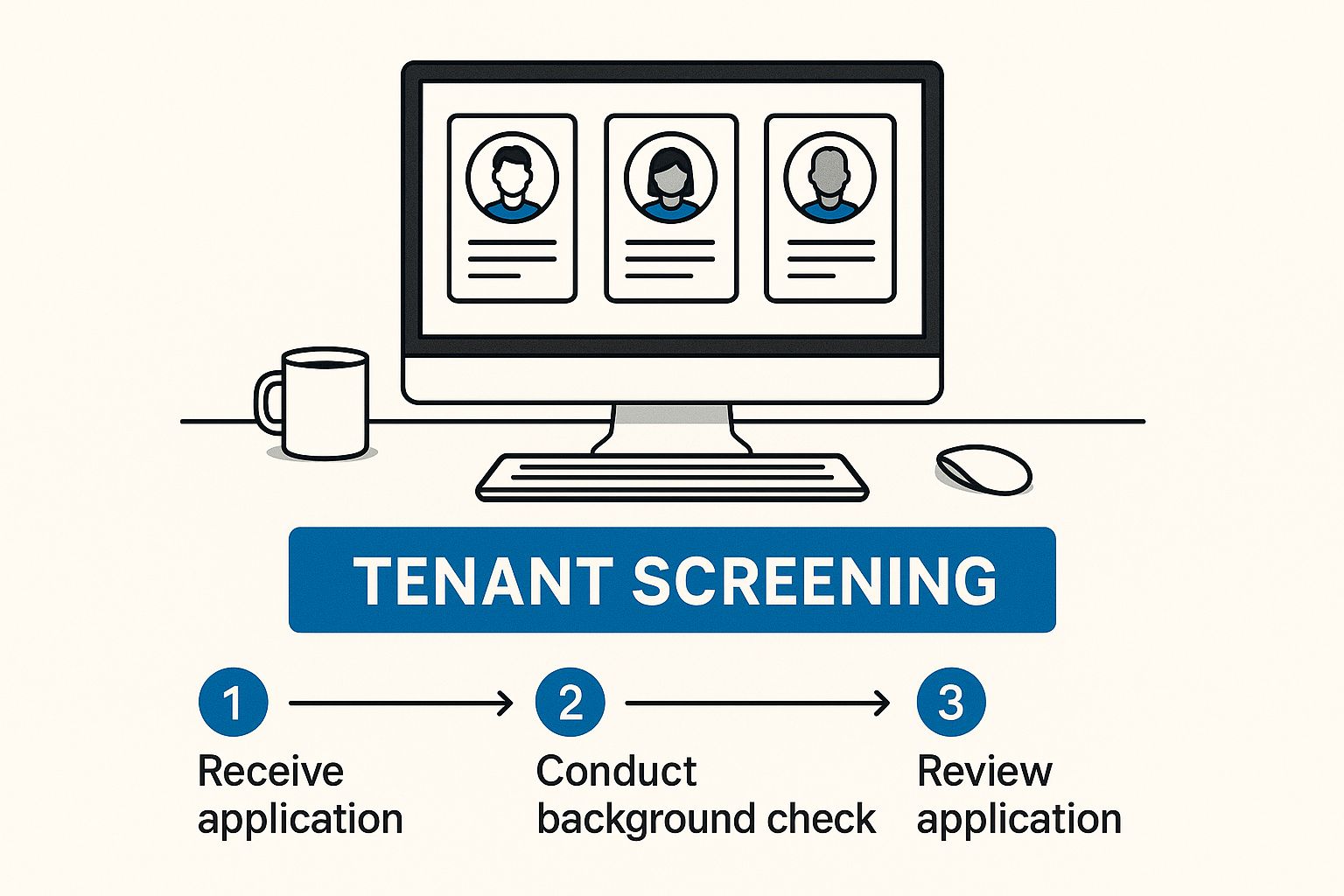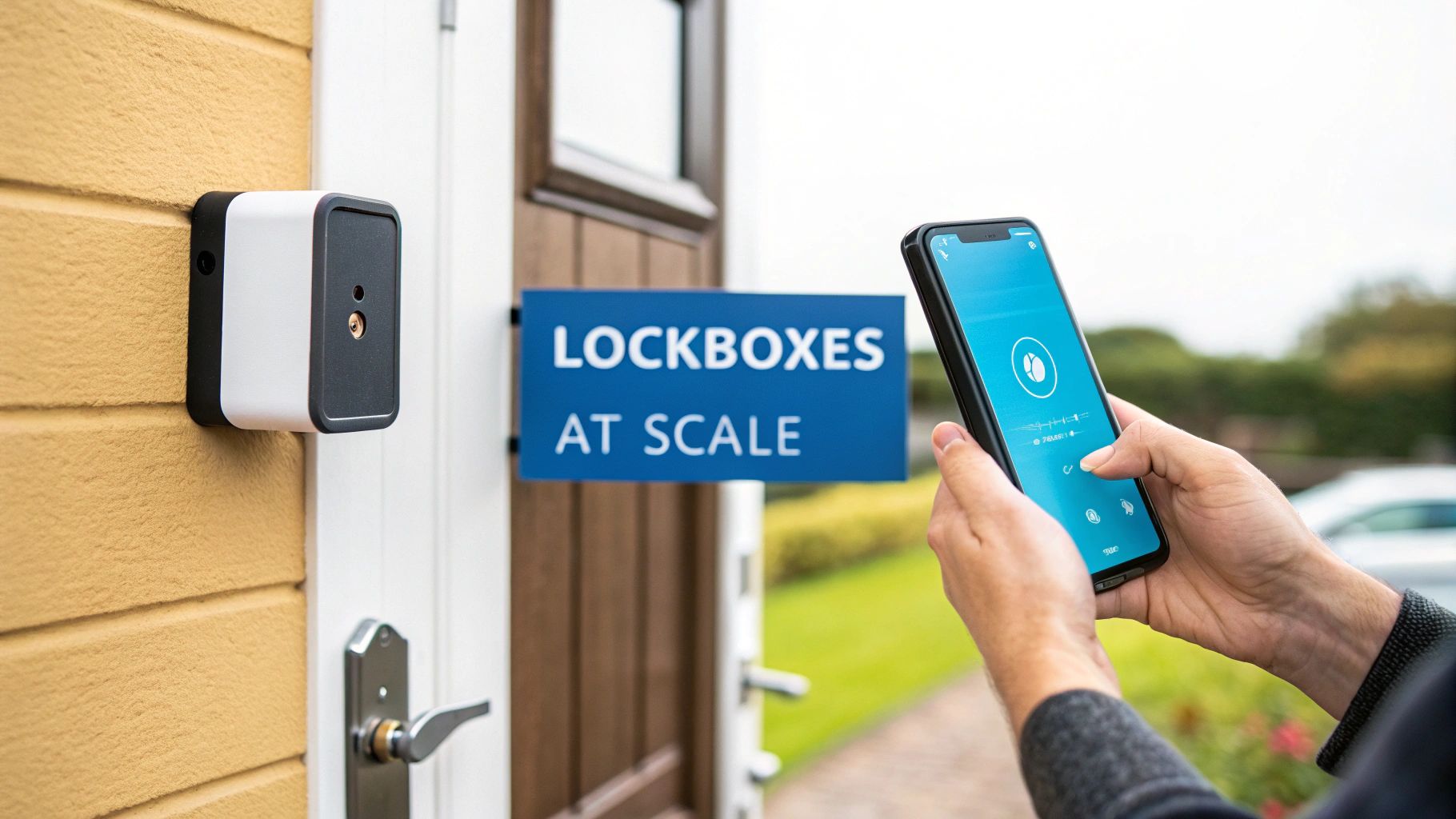The search for a great tenant doesn't start when you receive an application—it begins with a clear, proactive plan. To find the best tenants, you need to create a detailed profile of your ideal renter, write a compelling property listing that speaks directly to them, and price your unit competitively. This approach helps weed out unqualified leads from the get-go.
Defining Your Ideal Renter and Marketing Your Property
Before a single person even steps foot in your rental, you need to know exactly who you're looking for. This isn't about personal preferences; it's about building an objective profile based on criteria that predict a successful tenancy. Think less about who you'd want as a neighbor and more about who represents a stable, low-risk investment for your property.
Create Your Renter Profile
Start by outlining your non-negotiable, non-discriminatory qualifications. This profile will become your north star for every marketing and screening decision you make down the line.
- Income Stability: The industry standard is an income of at least three times the monthly rent. This simple benchmark ensures the tenant isn't stretching their finances too thin.
- Positive Rental History: You're looking for a proven track record of on-time rent payments and well-maintained properties. A glowing reference from a previous landlord is gold.
- Consistent Employment: A steady job history is often a good indicator of financial reliability.
- Clean Background: Establish your criteria for credit scores and criminal history, and—this is crucial—apply them consistently to every single applicant to stay compliant with Fair Housing laws.
Craft a Compelling Property Listing
With your ideal renter clearly defined, your property listing transforms from a basic classified ad into a powerful marketing tool. Once you know who you're targeting, putting some effort into property listing optimization strategies can dramatically increase your pool of qualified applicants.
Your rental ad is your first handshake with a potential tenant. It needs to do more than just list features; it must tell a story that makes qualified applicants feel like your property is the perfect fit for their lifestyle.
Your listing should be detailed, transparent, and visually stunning. High-quality photos are absolutely non-negotiable; they're often the first thing a prospect scrutinizes.
This image shows how combining crisp visuals with a benefit-driven description can make a listing pop and attract top-tier applicants.

When you highlight key amenities and use clear, benefit-focused language, you appeal directly to the renters you actually want to attract.
The move toward technology in property management isn't just a trend; it's a fundamental shift. The global tenant screening services market was valued at USD 3.67 billion in 2023 and is projected to hit USD 7.10 billion by 2032. This explosive growth shows just how serious the industry is about reducing financial risks and ensuring compliance.
When it comes to renting out a property, the showing is the moment of truth.
First impressions are absolutely everything. This is where a prospective renter walks in and decides, often within seconds, if your property could actually feel like home. A clunky, disorganized viewing process? It’s a huge turn-off and can scare away even the most qualified applicants. If you want to land great tenants, the experience needs to be professional and frictionless from start to finish.
Traditionally, property managers have been stuck between two less-than-perfect options: the open house or the individually scheduled tour. Open houses seem efficient on the surface—just lump everyone into one time slot. But in reality, they often attract a crowd of nosy neighbors and less-serious lookers, creating an impersonal, cattle-call vibe that high-quality applicants just don't have time for.
On the flip side, scheduling one-on-one tours gives you a chance to build real rapport and answer specific questions. It shows you value their interest. The problem? Manually coordinating dozens of these appointments is a logistical nightmare. It eats up your time, your gas, and almost always leads to frustrating scheduling conflicts.
A Modern Approach to Property Showings
Thankfully, we don't have to choose between those two options anymore. Technology has given us a much smarter middle ground. Platforms like Showdigs have completely changed the game by combining on-demand agents with smart lockboxes, creating a hybrid model that today's renters actually want.
This approach lets serious prospects book a self-tour whenever it works for them, even on short notice. That flexibility is a massive competitive advantage. Think about the busy professional who can only look at places after work or the young family trying to coordinate around nap times. By offering convenient self-showing options, you capture those top-tier applicants who would otherwise be lost to a more rigid schedule.
A seamless showing experience isn't just about convenience; it's a direct reflection of how you operate as a landlord. An easy, professional tour signals that you'll be an easy, professional landlord to work with—a key factor for discerning tenants.
Getting Your Property Ready for Its Close-Up
It doesn't matter how a prospect tours your property—if it's not in pristine condition every single time, you're sunk. A pre-showing checklist is your best friend for making sure you deliver a consistently positive impression.
Here's what should be on it every time:
- Boost That Curb Appeal: The very first physical impression happens before they even step inside. Make sure the entryway is spotless, the lawn is mowed, and the front door looks welcoming.
- Make It Impeccably Clean: This means a deep, professional-level clean. We're talking baseboards, ceiling fans, and especially the kitchens and bathrooms. No shortcuts here.
- Keep It Neutral and Bright: Open every blind and curtain to flood the space with natural light. A fresh coat of neutral paint can make any room feel bigger, newer, and more inviting.
- Do a Functional Check: Don't let a small issue create a big red flag. Test all the lights, run the faucets, and check the appliances. A flickering bulb or a leaky tap can scream "deferred maintenance" to a potential renter.
Once the viewing is over, don't drop the ball. A timely and professional follow-up is critical. A simple email thanking them for their time and—most importantly—providing a direct link to the online application can make all the difference. This proactive communication keeps the momentum going and helps turn a casual looker into a serious applicant.
Implementing A Fair And Rigorous Screening Process
Your screening process is your single best defense against nightmare tenants and costly eviction battles. This is where you shift gears from marketing your property to methodically vetting applicants. The goal is simple: measure every single person against the same fair, objective, and legally sound criteria.
Get it right, and you protect your investment and kick off a great landlord-tenant relationship from day one.
The very first thing you need is a written screening policy. Think of it as your rulebook. Before you even glance at an application, this document should spell out your criteria—minimum income levels, credit score requirements, and what you expect from their rental history. Sticking to this policy isn't just good practice; it's your key to avoiding discrimination claims and making decisions based on data, not gut feelings.
This is the essential flow every landlord and property manager should follow:

When you visualize the screening journey this way, you can see how each step builds on the last, making sure no critical detail gets missed.
Verifying Income And Employment
The classic rule of thumb holds true: an applicant's gross monthly income should be at least three times the monthly rent. But you can't just take their word for it.
Always ask for their last two pay stubs. Then, follow up with a direct call to their employer's HR department to confirm their job status and salary. For self-employed applicants, you'll need a bit more documentation. Ask for their two most recent tax returns and the last three months of bank statements to get a clear picture of their income and cash flow.
Pro Tip: Never trust the phone number on the application for employment verification. Do your own homework and look up the company's official contact information online. This simple step prevents you from getting tricked by a friend posing as a fake boss.
Conducting Credit And Background Checks
A credit report gives you a direct look into an applicant's financial habits. You're not just looking at the score. Scan for a consistent history of on-time payments, see how they manage their debt, and keep an eye out for major red flags like recent bankruptcies or accounts in collections.
At the same time, a background check will uncover any past evictions or a relevant criminal history. It's impossible to overstate the importance of thorough background checks in protecting your property and ensuring peace of mind.
To make sure you're covering all your bases, here’s a quick checklist of the essential screening components.
Essential Tenant Screening Checklist
A comprehensive and fair evaluation hinges on performing these critical checks for every single applicant.
By systematically working through this checklist, you create a process that is not only effective but also fair and consistent for everyone.
Calling Previous Landlord References
This might just be the most insightful step in the entire process. A quick chat with a past landlord can reveal what the numbers and reports can't. Don’t just wing it; have a list of specific questions ready to get the real story.
- Did they always pay their rent on time?
- How did they maintain the property? Did they report maintenance issues right away?
- Were there ever any complaints from neighbors?
- And the most important one: Would you rent to them again?
Pay close attention to the answer to that last question. A slight pause or a hesitant "yes" can tell you everything you need to know.
By systemizing each of these checks, you remove the guesswork and potential for bias. It’s all about finding a qualified, reliable renter who will treat your property right. To see how you can modernize this entire workflow, learn how Showdigs streamlines prospect screening to help you find ideal tenants faster and more efficiently.
Spotting and Stopping Rental Application Fraud
In today's rental market, a polished application can sometimes hide a world of trouble. Rental fraud isn't just a nuisance; it's a calculated scheme that can land you in a costly, months-long eviction battle with a professional tenant who never planned to pay a dime. If you want to protect your investment, you have to learn how to see through the deception before you hand over the keys.
This isn't some rare occurrence, either. The game has changed, making it tougher than ever to find good tenants. In fact, we saw fraudulent rental applications essentially double from 15% to 29% in just six months between February and August 2020. That’s a staggering jump that shows why a rock-solid screening process is no longer optional.

Common Scams and How to Spot Them
Fraudsters have gotten much better at their craft, moving beyond little white lies to create convincing, elaborate fronts. Their most common tricks involve doctored financial documents, fake references, and sometimes even entirely made-up identities.
- Fake Pay Stubs and Bank Statements: It’s frighteningly easy for someone to find a template online and create a pay stub that looks completely legitimate. Scammers often just edit PDF documents to inflate their income or erase a spotty financial history.
- Phony Landlord References: Be wary of the glowing reference. An applicant might just give you their friend's phone number, passing them off as a former landlord who will, of course, sing their praises.
- Synthetic Identities: This is a more sophisticated scam where fraudsters combine real and fake information (like a real name with a stolen SSN) to create a "synthetic identity." These can often pass basic background checks, making them incredibly difficult to track down once the rent stops coming.
Your Best Defense Is a Modern Offense
The only way to fight digital fraud is with smarter digital tools. If you’re still relying on paper documents or PDFs, you’re leaving the door wide open for scammers.
Your screening process is only as strong as your verification methods. If an applicant can easily fake their documents, your entire system has a critical vulnerability.
Instead of asking for a PDF of a pay stub, it’s time to switch to modern verification services. These platforms use secure, bank-level technology to connect directly to an applicant's bank account. This gives you an unchangeable, real-time picture of their actual income and account balances, completely sidestepping the risk of forged documents.
Red Flags to Watch For
Technology is a huge help, but you also need to trust your gut. Scammers often give themselves away with behavior that just feels off.
Keep an eye out for a prospect who:
- Is overly eager to rent sight-unseen. While there are legitimate reasons for this, it’s also a classic tactic to avoid any kind of in-person identity check.
- Offers to pay several months' rent upfront in cash. This is a huge red flag. It’s a common move to get possession of the property with no intention of ever paying again.
- Pressures you to rush the screening process. They might invent a sob story or an emergency, hoping you’ll get flustered and skip crucial steps like calling their references or employer.
- Provides inconsistent information. Does the Social Security Number not match their name? Is their driver's license from a different state than their stated address? These discrepancies are giant warning signs.
Staying vigilant and using the right tools can dramatically lower your risk of fraud. Taking these extra steps is a non-negotiable part of finding good tenants who will be true partners in protecting your property. For a deeper look at this issue, check out our post on how Showdigs is solving the growing epidemic of rental scams.
Using Technology for Smarter Tenant Selection
Let's be honest, manual tenant screening is a slog. It’s slow, it’s inconsistent, and it’s ripe for human error. Modern property technology, or proptech, isn't just about adding a little digital polish—it’s a massive competitive advantage that completely changes how you find and vet tenants. It helps you work faster, more accurately, and stay compliant.
The shift is already well underway. The global tenant screening market was valued at around $1.76 billion in 2024 and is on track to hit $2.6 billion by 2033. This isn't just random growth; it’s a direct response from property managers who need better, more reliable ways to reduce risk and make smart leasing decisions.
The Power of AI and Predictive Analytics
This is where things get really interesting. Artificial intelligence and predictive analytics are at the heart of this tech revolution, giving you a depth of insight that manual checks could never match. Forget just glancing at a static credit score. These systems can dive into thousands of data points to paint a complete picture of an applicant's financial health and reliability.
For instance, AI-powered tools can:
- Analyze real cash flow patterns to verify income, so you're not just relying on a PDF pay stub that could have been easily faked.
- Flag behavioral red flags from an applicant's digital trail that might hint at future problems.
- Score every applicant against your specific criteria, ensuring everyone is evaluated on the same objective standards. This is a huge win for Fair Housing compliance.
This data-first approach takes emotion and unconscious bias out of the picture. You end up making fair, evidence-based decisions every single time. For a deeper dive on this, check out this great resource on AI answering for property managers.
Creating an Integrated and Efficient Workflow
The real magic happens when you bring all this tech together under one roof. The best modern platforms can handle the entire leasing journey, from the first ad impression all the way to the signed lease. Think about it: a prospect sees your listing, schedules a tour automatically, and submits an application online, which then flows right into a digital background check.
Technology transforms tenant selection from a series of disjointed, time-consuming tasks into a single, automated, and highly efficient operation. This frees you up to focus on growing your business instead of getting bogged down in administrative work.
This kind of integration is the key to filling vacancies faster. When prospects can see a home on their own time and apply right away, you strike while the iron is hot. You not only lease properties quicker but also attract the kind of organized, tech-savvy tenants you actually want.
If you’re looking to speed up your own leasing timeline, take a look at our guide on 7 ways to lease quicker and cheaper. Ultimately, by embracing technology, you’re not just finding tenants—you’re building a smarter, more profitable rental business from the ground up.
Still Have Questions About Finding Tenants?
Even with a solid plan, you're bound to run into some tricky situations when picking tenants. It’s totally normal. Getting clear answers to those nagging questions is what gives you the confidence to make the right call for your property.
Let's walk through a few of the most common hurdles landlords face.
What Is the Best Way to Verify a Tenant's Income?
Honestly, the most bulletproof way to do it these days is with a third-party verification service. These tools link directly to an applicant's bank account, giving you a real-time, unbiased look at their income and cash flow. It completely sidesteps the headache of doctored pay stubs.
If you'd rather stick to the old-school method, that’s fine too. Just make sure you get their last two pay stubs, then do your own digging. Look up the employer's official HR department number—don't use the one they provide—to confirm they actually work there and what they make. For self-employed folks, you'll want to see their last two years of tax returns and their three most recent bank statements to get a clear picture of their earnings.
Can I Deny an Applicant Based on Their Credit Score?
Yes, you absolutely can, but there’s a huge catch: you have to be consistent. The trick is to set a minimum credit score requirement before you even start accepting applications. Put it in writing as part of your official screening criteria.
This standard has to apply to every single person who applies, no exceptions. That's how you stay on the right side of fair housing laws and avoid discrimination claims.
If you do reject someone because of their credit report, the law says you must send them an "adverse action notice." This is just a formal letter explaining why they were denied and providing the contact info for the credit reporting agency you used.
How Important Are Landlord References?
They're not just important—they're critical. A good landlord reference gives you priceless insights into an applicant's behavior that no credit check or background report will ever show.
Don't just ask, "Were they a good tenant?" Dig deeper with targeted questions like:
- "Did they always pay their rent on time?"
- "How did they take care of the property?"
- "Were there ever any complaints from the neighbors?"
- "Would you rent to them again?"
And here’s a pro tip: always verify that the reference is the actual property owner. A quick search of public property records can confirm this. You can also ask specific questions about the unit that only the real landlord would know. This simple step helps you sniff out a friend who's just pretending to be a past landlord.
What Should I Do If I Suspect an Application Is Fake?
If your gut tells you something is off with an application, listen to it. Start by cross-referencing everything they've given you—the application, their ID, the pay stubs. Do all the names and addresses match up perfectly?
Find the employer's official phone number yourself online and call to confirm employment. If you start finding major holes in their story or the applicant gets cagey when you ask questions, it's best to just deny the application for failing to meet your screening criteria and move on. It’s not worth the risk.
Finding great tenants is the bedrock of a successful rental business, but let's be real—the process can be a slow, risky grind. Showdigs changes the game with an AI-backed platform that handles the entire leasing funnel, from listing and pre-screening to on-demand agents who conduct automated showings.
Ready to cut down your vacancy time and lock in better tenants, faster? Learn how Showdigs can streamline your leasing process.







